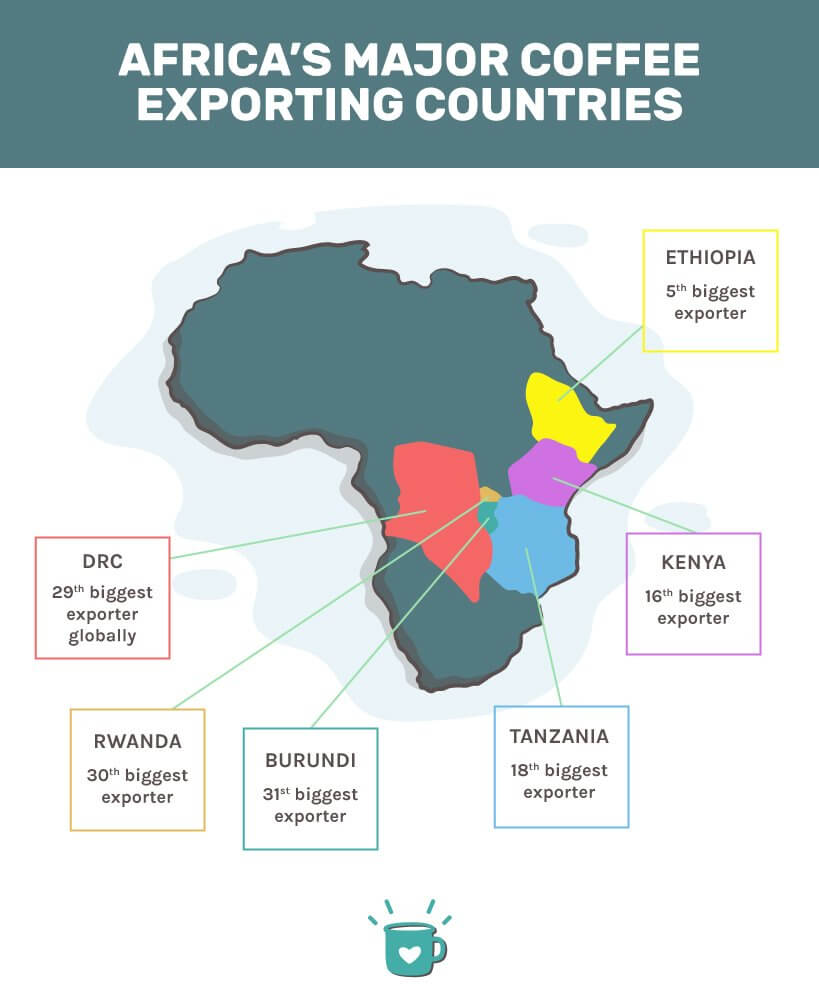African Coffees: Some of the finest in the world
Posted by Ken Poindexter on Jan 7th 2022
Experts have long been recognizing Kenya and Ethiopia as specialty coffee powerhouses. Now other African nations are coming into their own.
And we say hail to that!
Emerging players like Burundi and Tanzania offer high-grade African coffee that is good enough to rival the old guard.
Keep reading as we explore the African coffee industry through 6 of its biggest producers. We’ll talk about growing regions and flavor profiles. As a bonus, we’ll recommend some od the best African coffee beans you can try for yourself.
Many African nations grow coffee, particularly in East Africa. But only a few countries export high-quality Arabica coffee beans to the Western market. Here are seven African coffee regions you should know. From Ethiopia and Kenya’s well-established coffee regions, to up-and-coming producers like Burundi, the Democratic Republic of Congo and Uganda

1. Ethiopia
Coffee is now grown around the world, but Ethiopia is considered its homeland. Plus, it’s the largest coffee producer in Africa. The environment is so perfectly suited for the crop that Ethiopian coffeegrows wild, with more than a thousand different varietals present in the country. Perhaps not coincidentally, Ethiopia is one of few African nations that regularly consume coffee. Only about 50% of the crop is for export.
Coffee grows throughout the country. Yet, the high-elevation southern regions are most renowned internationally. Among these is the province of Sidamo, within which the town of Yirgacheffe produces coffee that is coveted worldwide. Other popular origins are the Guji region and Harrar.
The better natural processed coffees maintain the clean citric and floral notes with a touch of added sweetness and body compared to their washed counterparts.
You’ll rarely find high-end Ethiopian coffee given a dark roast as this can mask the subtle and complex flavors says Ken the roaster.
2. Kenya
Kenya doesn’t grow as much coffee as Ethiopia nor has quite as long a history. However, Kenya AA beans are recognized worldwide for their quality. This didn’t happen by chance; the country has invested heavily in research and coffee production to achieve this reputation.
The Kenyan coffee system’s unique aspect is the Coffee Auction. This is a weekly government-run auction in which roasters and green coffee dealers bid on the beans. The Auction is considered the most transparent selling method, and it helps farmers get higher prices for better beans (1).
The most prized Kenyan coffee beans are SL-28 and SL-34, so named because Scott Labs developed them. The beans are graded by size, with Kenyan AA coffee being the largest and most valued.
Most coffee from Kenya is grown by small-scale producers and cooperatives. Kenya’s biggest coffee regions are the high plateaus around Mount Kenya. The coffee is known for being full-bodied with bright acidity. The flavors are complex and delicate, featuring juicy fruits like blackcurrant and citrus and a spicy winy character.
Final Thoughts
We will have a part 2 to review more African coffees we offer. African coffee is some of the finest in the world. Though known collectively for their fruity flavors and winy acidity, each country offers unique assets thanks to differences in production, processing, and climate.
Use this guide to choose your favorite African coffee growing region, or better yet, treat yourself to a continental feast of coffee and try them all!

